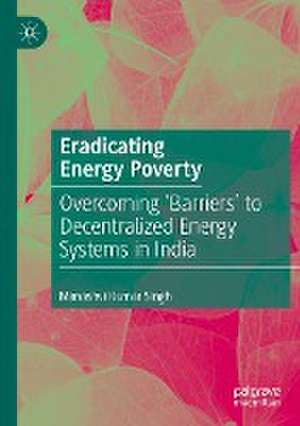Eradicating Energy Poverty: Overcoming 'Barriers' to Decentralized Energy Systems in India
Autor Manashvi Kumar Singhen Limba Engleză Paperback – 9 feb 2023
| Toate formatele și edițiile | Preț | Express |
|---|---|---|
| Paperback (1) | 719.74 lei 6-8 săpt. | |
| Springer Nature Singapore – 9 feb 2023 | 719.74 lei 6-8 săpt. | |
| Hardback (1) | 725.00 lei 6-8 săpt. | |
| Springer Nature Singapore – 8 feb 2022 | 725.00 lei 6-8 săpt. |
Preț: 719.74 lei
Preț vechi: 877.74 lei
-18% Nou
Puncte Express: 1080
Preț estimativ în valută:
137.79€ • 141.70$ • 114.31£
137.79€ • 141.70$ • 114.31£
Carte tipărită la comandă
Livrare economică 18 februarie-04 martie
Preluare comenzi: 021 569.72.76
Specificații
ISBN-13: 9789811674174
ISBN-10: 9811674175
Pagini: 423
Ilustrații: LVIII, 423 p. 132 illus., 123 illus. in color.
Dimensiuni: 148 x 210 mm
Greutate: 0.57 kg
Ediția:1st ed. 2022
Editura: Springer Nature Singapore
Colecția Palgrave Macmillan
Locul publicării:Singapore, Singapore
ISBN-10: 9811674175
Pagini: 423
Ilustrații: LVIII, 423 p. 132 illus., 123 illus. in color.
Dimensiuni: 148 x 210 mm
Greutate: 0.57 kg
Ediția:1st ed. 2022
Editura: Springer Nature Singapore
Colecția Palgrave Macmillan
Locul publicării:Singapore, Singapore
Cuprins
Part 1: Introduction to the Work.- Chapter 1: Theoretical Framework: The world view on energy, energy poverty, access to energy, energy ladder hypotheses, and the constraints of rural electrification policies.- Chapter 2: General profile of the electricity sector, genesis of rural electrification, overview of rural electrification programs, institutions and frameworks, policies, appropriateness of rural electrification, statement of purpose, work details.- Part 2: Research Methodology.- Part 3: Case Studies as a critical component of mixed method research.- Part 4: Collectivism of energy access through local energy needs assessment evidence-based policy.- Part 5: Rural energy collectivism through decentralized energy systems.- Part 6: Conclusion: Overcoming Barriers.
Notă biografică
Dr. Manashvi Kumar belongs to the 2004 batch of the Indian Administrative Service (IAS) of Punjab cadre. He has an exceptional bachelor’s and master’s degree in earth sciences and an award-winning doctorate in political science. His academic interest spans across subjects pertaining to land, water, energy and power, climate change, regulatory capture, government failure, comparative public policy, inter-disciplinary research, mixed methods research, evidence-based policy and policy analysis.
Textul de pe ultima copertă
Dr. Manashvi Kumar presents an incredibly nuanced examination of complex and intertwined conditions that are termed as Energy Poverty. An officer of India's elite civil service (Indian Administrative Service) he has used his zeal for ground level social transformation to conduct extensive field-based studies in a vast swath of rural India to produce this remarkably comprehensive and well researched book. Using multiple methods including surveys and quantitative measures as well as careful ethnographic sensibilities, he offers novel insights into the barriers of energy access for the rural poor, and significantly how (political) power and the distribution of (electrical) power are enmeshed. He argues for policy solutions that are sensitive to the micro-dynamics of socio-cultural contexts in which people and power co-exist.
-- Professor Navdeep Mathur, Public Systems Group, Indian Institute of Management, Ahmedabad.
-- Professor Navdeep Mathur, Public Systems Group, Indian Institute of Management, Ahmedabad.
Decentralized energysystems paradigm calls for – a) evidence-based policy for local resource assessment, and b) context-specific energy needs assessment for- overcoming ‘barriers’ to decentralized energy systems in India. The pristine bedrock of the book comprises theoretical underpinnings of empiricism, behaviourism and realism. These concepts find their extension through inter-disciplinarity, and the mixed methods approach adopted for understanding spaces and cultures of energy consumption. Demand side management in energy sector entails-migration from a target-based (TB) approach towards an evidence-based (EB) approach for designing context-based policies in respect of energy demand, and an associated policy shift from a techno-economic regime towards a socio-technical regime embedded in ‘appropriate’ contexts. “Prosumerism holds the key to democratization of energy systems in India.”
Dr. Manashvi Kumar belongs to the 2004 batch of the Indian Administrative Service (IAS) of Punjab cadre. He has an exceptional bachelor’s and master’s degree in earth sciences and an award-winning doctorate in political science. His academic interest spans across subjects pertaining to land, water, energy and power, climate change, regulatory capture, government failure, comparative public policy, inter-disciplinary research, mixed methods research, evidence-based policy and policy analysis.
Dr. Manashvi Kumar belongs to the 2004 batch of the Indian Administrative Service (IAS) of Punjab cadre. He has an exceptional bachelor’s and master’s degree in earth sciences and an award-winning doctorate in political science. His academic interest spans across subjects pertaining to land, water, energy and power, climate change, regulatory capture, government failure, comparative public policy, inter-disciplinary research, mixed methods research, evidence-based policy and policy analysis.
Caracteristici
Provides comprehensive understanding of energy poverty Unravels the trajectory of various Centralized Rural Electrification policies Evaluates its symbolic, symptomatic presence in the contemporary context of claims
